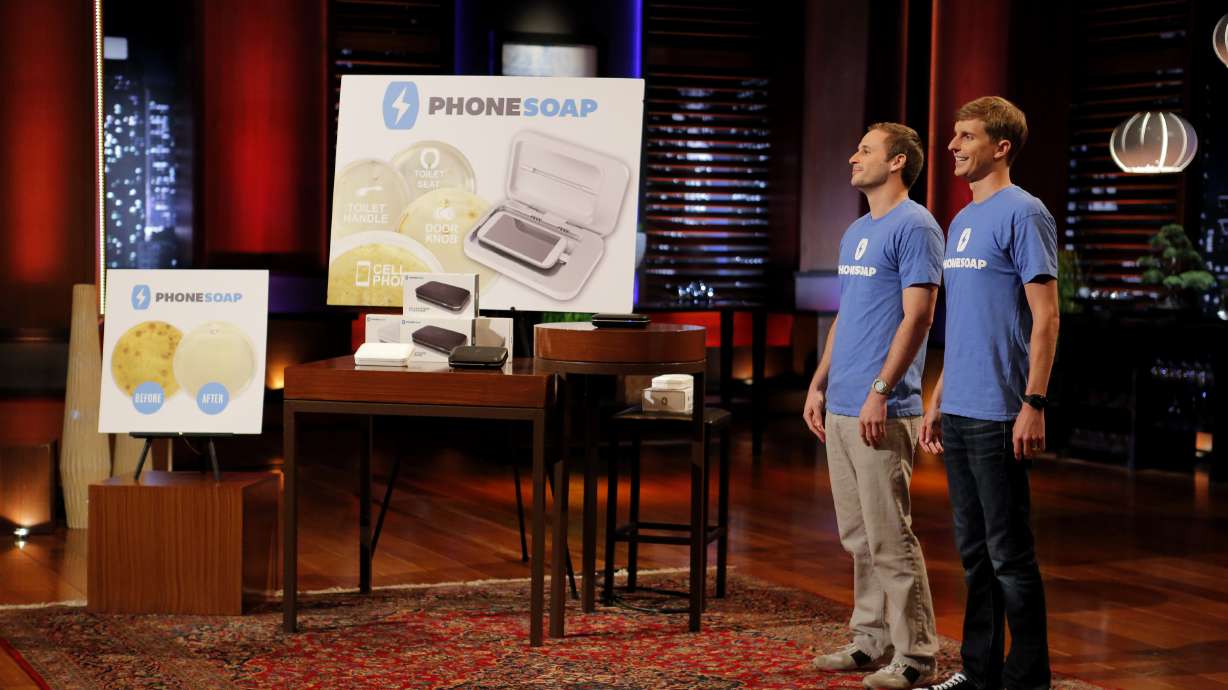Estimated read time: 3-4 minutes
This archived news story is available only for your personal, non-commercial use. Information in the story may be outdated or superseded by additional information. Reading or replaying the story in its archived form does not constitute a republication of the story.
PROVO — Have you ever thought about how dirty your cellphone might be?
Two cousins, Wesley LaPorte and Daniel Barnes, pitched their solution to germy phones on "Shark Tank" Friday — the duo's company, PhoneSoap. They asked Shark Tank investors for a $300,000 investment in return for 7.5 percent of their company. The ended up making a deal with Lori Greiner for $300,000 in exchange for 10 percent of equity stake in the PhoneSoap company.
"We pitched our product like we normally pitch it, which is that our cellphones are abnormally dirty or germy because of the way that we use them," LaPorte said. "Usually with things that become unusually dirty we clean them, but we don't clean our phones."
PhoneSoap makes a charger that encases a phone and uses UV light to kill any bacteria on the device. The idea for the product was sparked by a news article the cousins read that said the average cellphone is 18 times dirtier than a public toilet.
LaPorte, who was working in a cancer research lab at Brigham Young University at the time, said he wanted to test the finding himself. He described cellphones as being "like a petri dish in our pocket." Since phones are often stored in pockets and other warm places, germs on the device are able to breed.
"Being in a lab, I swabbed different surfaces and tried to find out what was dirtier than my phone and nothing really was," he said. "My phone really was the dirtiest thing that I could find."

The cousins had long been involved in entrepreneurial pursuits, including running their own window washing and curb painting businesses together in high school, so they decided to try their hand at finding a solution to improve the cleanliness of phones.
LaPorte knew ultraviolet light was effective at killing microorganisms from his work in the lab, so the duo shrunk the technology down and added a phone charger. They first pitched the idea at a BYU business plan competition and, after winning some money there, moved onto other competitions like the international business plan competition at Rice University.
At that point, they decided to take their product to Kickstarter. The campaign exceeded its $18,000 goal and raised $63,478 by the end of its run. Since the 2012 Kickstarter launch, LaPorte estimated they have sold tens of thousands of PhoneSoap chargers, including those through 400 Staples stores, they said on Shark Tank.
"It's obviously a very useful product, so it's one that really resonates with a lot of people — not just people that are ‘germaphobes,' but anybody who is generally concerned with hygiene and realizes how dirty their phones are," he said. "The same people who wash their hands and brush their teeth are the ones that want to use PhoneSoap once they understand the reality of our phones getting so dirty."
PhoneSoap's next product is a tablet "soap" locker aimed at businesses, schools and hospitals that deploy shared-use tablets.








